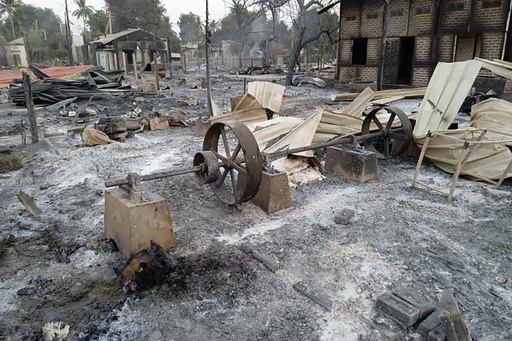
In a recent address to the UN General Assembly’s human rights committee, the U.N. special envoy for Myanmar, Julie Bishop, emphasized the dire situation unfolding in the Southeast Asian nation. She described an escalating conflict alongside rampant criminal activity and unprecedented levels of human suffering, underscoring that Myanmar is in a state of crisis.
Bishop, who was appointed by Secretary-General Antonio Guterres in April of this year, urged those involved in the Myanmar situation to move away from a “zero-sum mentality.” This call for collaboration comes in the wake of the military coup that ousted the elected government of Aung San Suu Kyi in February 2021. Following the coup, the military aggressively suppressed peaceful protests that sought to restore democracy, resulting in increased violence and a profound humanitarian disaster.
Over the past year, several powerful ethnic armed groups have seized territory, putting the military regime under significant pressure and causing hundreds of thousands of civilians to flee their homes. The United Nations reports that around 3 million people have been displaced within Myanmar, while approximately 18.6 million individuals are in dire need of humanitarian aid.
Bishop called for an immediate halt to the violence, emphasizing that progress in addressing the populace’s needs is unattainable as long as armed conflict persists throughout the country. As a former Australian foreign minister, she noted her efforts to engage with various stakeholders, including Myanmar’s military leaders, opposition figures, ethnic armed groups, women’s organizations, and human rights advocates. However, she did not provide specific details about these discussions.
Her diplomatic outreach has included meetings with current and past ASEAN chairs in several countries across Southeast Asia. Furthermore, Bishop has visited neighboring nations such as China and Thailand, with plans to travel to India and Bangladesh soon. She aims to encourage these countries to leverage their influence on Myanmar. While she indicated plans to return to Naypyidaw, no specific timeline was mentioned.
During a recent summit involving the United Nations and the Association of Southeast Asian Nations (ASEAN), Bishop pointed out that Secretary-General Guterres supported enhanced cooperation between the U.N. envoy and the ASEAN chair to cultivate a “Myanmar-led process.” A key component of this initiative hinges on the effective execution of a five-point ASEAN plan that Myanmar’s leaders committed to in April 2021, which has seen little action to date. This plan calls for an immediate ceasefire, dialogue facilitated by an ASEAN envoy, humanitarian assistance access, and a visit to Myanmar by the ASEAN special envoy to engage with all relevant parties.
Bishop argued that any approach toward reconciliation must focus on ending violence, ensuring accountability, and providing unrestricted access for the U.N. and its partners to assist marginalized groups, including the Rohingya population, ethnic communities, and particularly women and youth. However, she noted the alarming increase in civilian casualties and highlighted the erosion of the rule of law as transnational crime flourishes in Myanmar.
The extent of arms production, human trafficking, illegal drug manufacturing, and online scams has led Myanmar to rank highest among all nations for organized crime. Bishop asserted that these criminal networks have spiraled out of control. Moreover, she echoed Guterres’ insistence on the urgent need to establish a pathway back to democratic governance and civilian rule.
While discussing the situation, Bishop expressed concern over the military’s intentions to conduct elections amid ongoing conflict and numerous human rights abuses. She cautioned that the situation in Myanmar risks being overlooked in global discussions. She underscored that the ramifications of the crisis extend regionally and should not be underestimated on a global scale.
